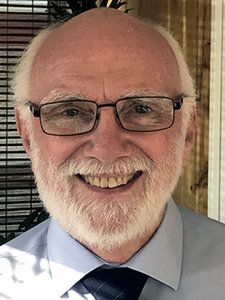Some doctors thrive in a personality-based clinic and have a loyal following no matter what services or equipment they offer, but for most chiropractic offices who are trying to grow and expand, new equipment purchases help us stay relevant and continue to service our client base in the best, most up-to-date manner possible. So, regarding equipment purchasing: should you lease, get a bank loan, or pay cash?
Dr. Ken Yorgan: A DC on the Congressional Campaign Trail
Dr. Ken Yorgan, a 1981 graduate of Logan College of Chiropractic running for U.S. Congress (1st district, Wisconsin), is no stranger to leadership. As a freshman at Logan, he served as president of his class and later as student body president. He organized and hosted the first gathering and founding of the World Congress of Chiropractic Students, and practiced briefly in St. Louis and Baltimore before returning to his hometown of Racine, Wisc., in 1984.
Dr. Yorgan served on the Wisconsin Chiropractic Association (WCA) board, as well as its peer-review and government affairs committees. In 1996, he took a lawsuit to the Wisconsin Supreme Court, pro se, which contributed to them changing their rules for attorney behavior. He has also been active in his community as chairman of the Racine Coalition for Peace and Justice, the Inner City Council on Substance Abuse and the Racine Equality Project. Learn more about how Dr. Yorgan plans to improve health care and chiropractic in this exclusive interview.
What are the main points of your platform as they relate to health care and health care reform? Foremost has to be my belief that the old insurance paradigm is obsolete. The option with the greatest impetus is "Medicare for All," and I support this as a platform upon which we can build a system that will be much more inclusive for patients and providers. It may take years to be perfected, but thoughtfully crafted it will be huge improvement on day one. What we have now is ridiculously expensive, inequitable and ineffective; it's a national embarrassment.

How can the chiropractic profession best position itself to influence and participate in health-care policy decisions on a state and national level? The obvious answer is, elect people from our profession to state and national offices. I am not a single-issue candidate, but health care, and especially chiropractic, is a significant part of what motivates me to run. We need someone from among us sitting at the table, rather than depending on lobbyists to carry our message. The core philosophy of chiropractic is well-suited to public service across the board.
In your opinion, what are the main factors (internal and external) keeping the chiropractic profession from advancing in mainstream health care, and what can it do to better its position? Internally it's the dispute over just what is and isn't chiropractic. In 1980, I was working to organize an intercollegiate student conference, with the purpose of creating a dialog within the student population that would transcend the existing straight / mixer argument and foster understanding and acceptance that could carry forward into the field. I was called into the college president's office and clearly informed that if I extended an invitation to Sherman and ADIO, I would not be allowed access to, nor use of, any of the facilities or services on campus.
I made a choice that went against everything the conference was to be about, but did so in the hope that future students would take ownership of the organization and correct that deficiency. That first conference was the founding of the World Congress of Chiropractic Students, and they just completed their annual convention in Johannesburg, South Africa. With students of 27 chiropractic schools now members of the WCCS, I have to believe that our original intent is being served. There is nothing I've done in my life that I am prouder of.

As for external factors, full and equitable inclusion in what is in all probability going to be an American national health care program would be tremendously powerful.
What is stopping the 85-90 percent of patients who do not choose chiropractic care, and how can that be changed on both a political and professional level? I live and work in a post-industrial, rust-belt city where peoples' choices are influenced by economics, which is substantially affected by insurance coverage. Insurance is obsolete and should be replaced by a mechanism whereby we the people use government as a financial tool or group purchasing agent.
Health insurance was started by medical practitioners in Massachusetts in the 1920s as a strategy to expand public access to their services and stabilize their income stream. That was a time when the abrasive relationship between medicine and chiropractic was as hot as it has ever been. Is it any surprise that chiropractic has had to struggle for inclusion in health insurance plans?
I believe that full and equitable inclusion in a national health care plan and greater public awareness of the community services that chiropractors routinely engage in would be tremendously helpful.
If elected to Congress, what will your top priority be to improve the health care system – for health care professionals (DCs included) and patients? We presently have the most expensive health care in the industrialized world, producing some of the worst outcomes. Prior to the Affordable Care Act, "administrative costs" sometimes ran as high as 40%. The ACA capped it at 25%. Medicare operates at below 2% and sometimes below 1%. I ask my conservative friends, "Just what is conservative about paying 25 to 40% for something that could be bought for 2%?"
I realize that "Medicare for All" sounds frightening to many participating providers, which is precisely why we need someone sitting at the table who has been in the trenches. It will be a complicated and demanding process, and we cannot expect it to effectively serve and protect our profession and our patients without our direct involvement.
Other chiropractors have run for U.S. Congress in the past and failed, often due in no small part to medical lobbying. Why will this time be different and what would it truly mean to have a DC in Washington, D.C.? Again, I am not a single-issue candidate, and I have experiences and relationships that transcend partisan and professional prejudices. I'm running as an independent, and voters are responding. I have no doubt that I could be seen as a threat and subjected to attack. That's the reality of American politics. My objective is to get my message directly to the voters, and we'll see what happens.
Within my community, I have supporters from across the political spectrum. Members of the original Tea Party, disgruntled Democrats, rebellious Republicans, Libertarians and Greens are part of the campaign. I've even had MDs tell me they will vote for me. It's going to be interesting.
Anything else you'd like to add? Absolutely! Go to the website http://yorganforcongress.com and see if it inspires you. We're running a financially lean and creative campaign, and could use additional support. If you'd like to see a DC in D.C., get out your checkbook or your credit card and get involved, and tell others!



